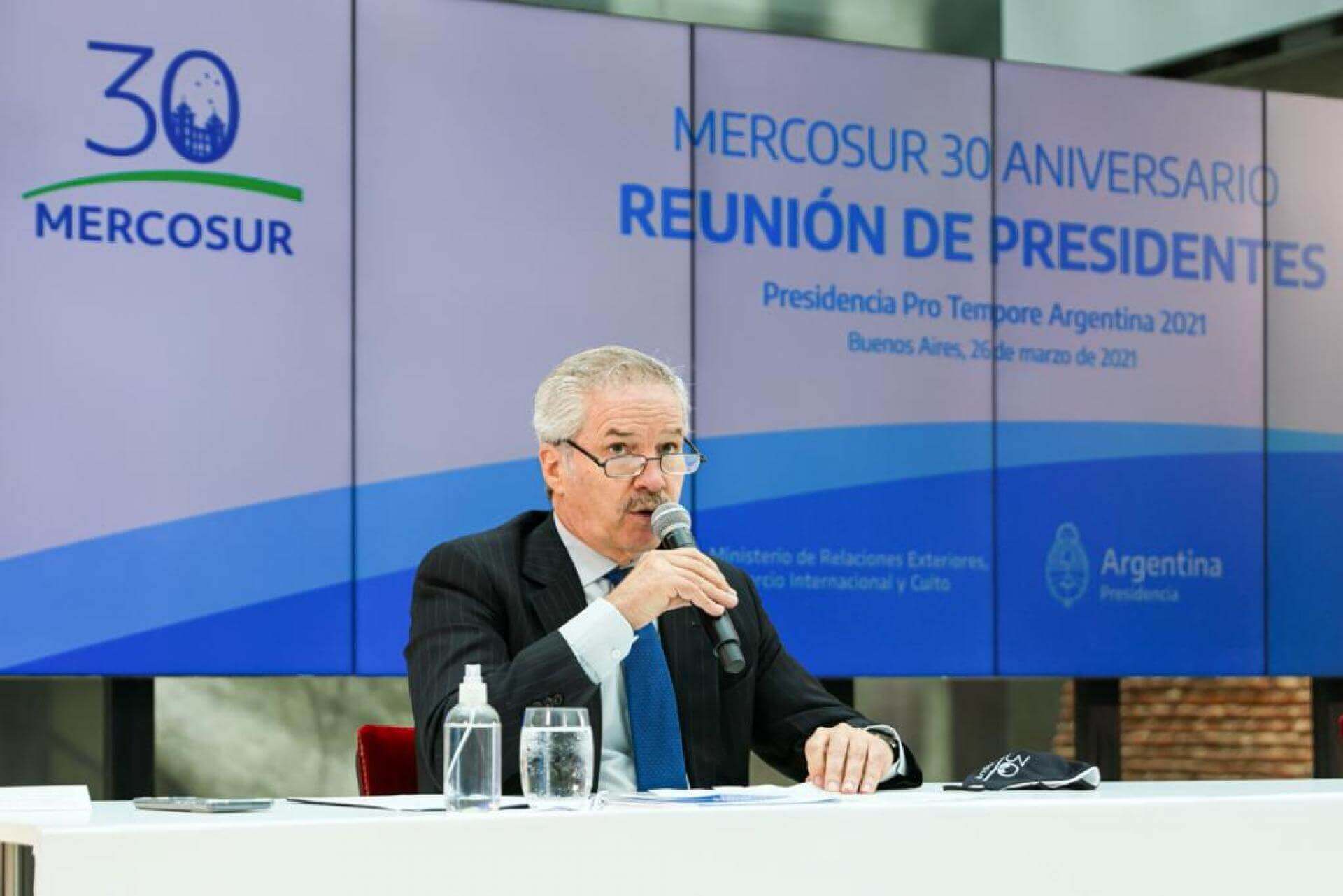On Monday, the foreign ministers (FMs) of regional trading bloc Mercosur member-states held a virtual meeting to discuss their divergent stances on a common external tariff and their ability to enter into unilateral trade agreements with non-member states.
Unlike Argentina, Uruguay and Brazil wish for the regional trading bloc to allow member states to enter into unilateral trade deals with non-member states and for the common external tariff to be lifted.
At the meeting, Argentinian FM Felipe Solá expressed once again express Buenos Aires’ willingness to work with partners to reduce the common external tariff after earlier saying that it is required to protect domestic industries.
Argentina finally relented in its position earlier this month, when it agreed to reduce tariffs and even remove them on 1,900 items that have been identified as having no impact on domestic industries.
Keeping these changes in mind, Solá stressed upon the need to use a ‘segmented’ approach in the agro-industrial, industrial, capital goods, information technology, and telecommunications industries, so as to protect vulnerable domestic sectors.
The Argentinian diplomat said, “We must think about what capacities different sectors of the economy have to withstand a reduction in different positions of the common external tariff and what implications a unilateral reduction has in the face of external negotiations.”
Prior to the meeting, Uruguayan President Luis Lacalle Pou announced that his government had submitted a proposal that calls for Mercosur states to be granted “tariff preferences” when entering into trade agreements with non-members.
The Uruguayan foreign ministry’s proposal suggests: “The countries that start negotiations must inform the GMC [Common Market Group, the Mercosur’s Executive body] of the beginning of talks, providing the information requested. Likewise, they must keep the GMC informed about the evolution and progress of negotiations.”
It is believed that Uruguayan FM Francisco Bustillo presented this proposal at Monday’s meeting.
The bloc is currently fractured over members’ inability to enter into unilateral trade deals with non-member states. Uruguay and Brazil are both in favour of relaxing these restrictions. Argentina, though, contends that any trade deals made with non-members must include all the members of Mercosur. However, this means that any state can veto trade agreements for the whole bloc.
These tensions came to a head at March’s heads of state meeting, when Uruguayan President Lacalle Pou and Brazilian President Jair Bolsonaro both called for Mercosur to be made “more flexible”, with the Uruguayan leader saying that the body should not be a “burden” or a “corset” on members. At the time, Argentinian President Alberto Fernández issued a strong response to Lacalle Pou’s comments, saying, “If we have become a burden I am sorry, the easiest thing to do is to get off the boat.”
Although Argentina has since sought to cool tensions, with Minister of Productive Development Matías Kulfas expressing confidence that Mercosur members would work out their differences through dialogue, the dispute between Argentina and Uruguay and Brazil remains.
Argentina, however, is growing increasingly cognisant of the fact that Mercosur holds little value if its members are not able to come to an agreement, given that all decisions require unanimous consensus. In fact, before the meeting, Solá acknowledged that “Mercosur is not expanding as it should, not only due to a lack of trade deals.”
He went on to say: “With regard to the common external tariff, I think we will negotiate better if we assume a high CET and then decide together which tariffs should be reduced and how much they should be reduced in a realistic way. We believe it is time, more than ever, to unite and examine carefully where we can help. This is not the time to cut yourself. That is the idea that we will bring to the meeting of the foreign ministers of the bloc on the 26th.”
It is unclear at this stage how Argentina and other members reacted to Uruguay’s proposal. However, Monday’s meeting sets the stage for the next month’s in-person meeting between the foreign ministers of Argentina, Brazil, Uruguay, and Paraguay in Buenos Aires.
Mercosur Remains Divided Over Common External Tariffs & Trade Agreements With Non-Members
Unlike Argentina, Uruguay and Brazil wish for Mercosur to allow member states to enter into unilateral trade deals with non-member states and for the common external tariff to be lifted.
April 28, 2021

IMAGE SOURCE: ARGENTINA MFAArgentinian Foreign Minister Felipe Solá
